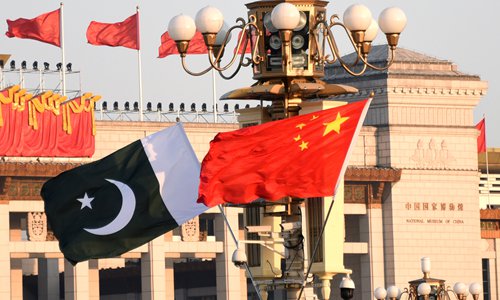HOME >> CHINA
China, Pakistan ink deals
By Cao Siqi and Wang Wenwen Source:Global Times Published: 2019/10/8 22:45:02
CPEC, Kashmir issues discussed during Khan visit

National flags of China and Pakistan flutter in front of the Tiananmen Square on Tuesday. Photo: IC
Chinese Premier Li Keqiang on Tuesday met Pakistani Prime Minister Imran Khan, who is paying a two-day visit to China, and two sides signed agreements on infrastructure, law enforcement, security and culture cooperation.
Khan will attend the closing ceremony of the 2019 Beijing International Horticultural Exhibition on Wednesday and meet Chinese President Xi Jinping, according to China Central Television.
Li said China was pleased to know that Pakistan has tided over a period of economic difficulties and was willing to continue to provide assistance.
"We are willing to continue to promote the high-quality development of the China-Pakistan Economic Corridor (CPEC), strengthen cooperation in the areas of infrastructure, trade, economy and finance, and take effective measures to promote a more balanced development of China-Pakistan trade and protect the safety of Chinese-funded institutions and personnel in Pakistan," Li said.
Premier Li also stressed that China has always placed China-Pakistan relations in the priority of neighboring diplomacy, firmly supported the Pakistani side in defending the country's independence, sovereignty and territorial integrity and legitimate rights and interests.
Khan said Pakistan was willing to speed up construction of the Belt and Road Initiative with China and attaches great importance to the construction of the CPEC and the Gwadar port.
"Pakistan is willing to expand the scale of trade and investment with China, accelerate cooperation in various fields, and promote new progress in bilateral relations," he said.
The visit continues the long-established tradition of the leadership of the two countries meeting regularly and consulting closely on bilateral, regional and international issues of mutual interest, according to a statement provided by the Pakistani Embassy in China on Tuesday.
This visit emphasizes further cementing Pakistan's economic, investment and strategic ties with China, Li Li, professor of the institute of international relations at Tsinghua University and director of the center for South Asian studies, told the Global Times.
On Tuesday afternoon, Khan talked with Chinese companies about the Pakistan-China trade and investment opportunities in the new era, a source close to the delegation told the Global Times on Tuesday.
Khan will exchange views on regional developments including the state of peace and security in South Asia arising from the Indian government's decision to revoke the special status of India-controlled Kashmir on August 5, the embassy's statement said.
Khan's frequent visits to China and regular meetings with Chinese leaders shatter all the noises that the new government was not serious about the CPEC, Ghulam Ali, an associate professor at the school of Marxism, Sichuan University of Science and Engineering, told the Global Times on Tuesday.
While the corridor remains a key topic, Khan will also discuss regional issues especially tension with India and peace talks in Afghanistan, Ali noted.
New Delhi in August issued a presidential decree to scrap Kashmir's special status, tightening its grip on Kashmir, a region also claimed by Pakistan.
Pakistani Ambassador to China Naghmana Alamgir Hashmi told the Global Times in an exclusive interview previously that India's move on Kashmir would not affect corridor projects.
"There are expectations in Pakistan that China should come forward with a relatively more active role in this crisis which is favorable to Pakistan," Ali said.
Khan's visit to China comes days ahead of the Chinese top leader's reported visit to India.
Indian media reports said President Xi will take part in the second informal summit with Indian Prime Minister Narendra Modi at Mamallapuram near Chennai but there has been no official announcement from the Chinese side.
Tsinghua University Professor Li Li noted that the Kashmir issue was a dispute born out of the region's colonial history and should be properly handled in a peaceful way in line with the UN Charter, relevant resolutions of the UN Security Council and bilateral agreements between Pakistan and India.
Wang Bozun contributed to this story
Posted in: DIPLOMACY